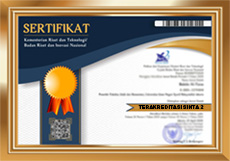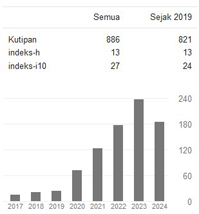Telaah filosofis tentang keadilan kontributif dan Martabat kerja manusia serta implikasinya bagi Paradigma ekonomi
Abstract
Abstract This article aims to present the limitations of distributive justice theory as a conceptual foundation of the paradigm of the growth and prosperity in economy, and then proposing the idea of contributive justice and the dignity of human work as a new economic paradigm. Why is contributive justice important, and what is its relevance in the discourse of economic paradigm? By using the method of literature study and critical analysis, this article indicates that the idea of contributive justice is essential to overcome the lack of distributive justice. The distributive justice fails to understand that human labour is not only economic. Human labor is not just an instrument for consumption purpose. Human labour is essentially social and cultural. Based on the very idea of contributive justice, human labour is a source of individual self-social esteem, the way of contributing for common good and winning the social recognition from the society. Amid the global economic competition that intensifies the social and economic inequality, contributive justice offers the idea of dignity of human work as a new paradigm of economy. This article concludes that economic efforts in the 21st century, both in the global and in Indonesia, must consider
the dignity and value of human work.
Key Words : Distributive justice; contributive justice; economy; the dignity of human work.
Full Text:
PDFReferences
Amstrong, Chris. 2012. Global Distributive Justice. UK: Cambridge University Press.
Arendt, Hannah. 1959. The Human Condition. New York: Doubleday & Company Inc.
Bailey, C. 2019. “A Review of the Empirical Literature on Meaningful Work: Progress and Research Agenda.” Human Resource Development Review, Vol. 18(1).
Banks, Mark. 2019. Cultural Work and Contributive Justice. Journal of Cultural Economy. https://doi.org/10.1080/17530350.2022.2058059.
Dhakidae, D. 2015. Menerjang Badai Kekuasaan. Jakarta: Kompas.
Dhakidae, D. 2017. “Sejarah Berakhir dan Sejarah Baru Berawal.” Prisma, Vol. 36 (3).
Fleischacker, Samuel. 2014. A Short History of Distributive Justice. London: Harvard University Press.
Gomberg, Paul. 2016. Why Distributive Justice Is Impossible but Contributive Justice Would Work. Science & Society, Vol. 80 (1): 31–55.
Kymlicka, Will. 2011. Pengantar Filsafat Politik Kontemporer, penerj. Agus Wahyudi. Yogyakarta: Pustak Pelajar.
Latif, Yudi. 2011. Negara Paripurna, Historisitas, Rasionalitas dan Aktualitas Pancasila. Jakarta: Gramedia.
Madung, Otto Gusti. 2013. Filsafat Politik. Maumere: Ledalero.
Magnis-Suseno, Franz. 1999. Pemikiran Karl Marx: Dari Perselisihan Revisionisme ke Sosialisme. Jakarta: Gramedia.
Murdiyan & Mulyana. 2017. Analisis Kebijakan Pengentasan Kemiskinan di Indonesia. Jurnal Politik dan Pemerintahan, Vol.10 (1): 73-96.
Olsaretti, Serrena. 2018. The Idea of Distributive Justice. In The Oxford Handbook of Distributive Justice. London: Oxford University Press, DOI:10.1093/oxfordhb/9780199645121.013.38
Orsi, Cosma. 2018. Power and Poverty: Social Legislation in the Years of Adam Smith. In Power in Economic Thought, ed. M. Mosca. New York: Palgrave. https://doi.org/10.1007/978-3-319-94039-7_6.
Rani, Renny Putri Harapan. 2020. “Analisis Paradigma Pembangunan di Indonesia.” IJI Publication, Vol. 1(1).
Rawls, J. 2009. A Theory of Justice. Massachusetts: Harvard University Press.
Sachs, Jeffrey D. 2005. The End of Poverty Economic Possibilities for Our Time. New York: Penguin Press.
Sandel, M. 2000. The Tyranny of Merit: What’s Become of the Common Good? USA: Farrar, Straus and Giroux.
Sandel, M. 2020. What Liberals Get Wrong about Work. The Atlantic, https://www.theatlantic.com/ideas/archive/2020/09/contributive-justice-and-dignity-work/615919/.
Sandel, M. 1998. Liberalism and The Limit of Justice, Second Edition. USA: Cambridge University Press.
Sandel, M. 2010. Justice What’s the Right Thing to Do? New York: Farrar, Straus and Giroux.
Sayer, A. 2009. Contributive Justice and Meaningful Work. Res Publica, Vol. 15. No. 2.
Sayer, A. 2011. Habitus, Work and Contributive Justice. Sociology, 45(1): 7-21. DOI: 10.1177/0038038510387188.
Sihotang, Kasdin. 2020. Etika Kerja Unggul . Jakarta: Kanisius.
Smith, Adam. 2018. The Wealth of Nations. CreateSpace Independent Pubishing Platform.
Sonbay, Yolinda Yanti. 2022. “Kritik terhadap Pemberlakuan Teori Agensi dalam Pengelolaan Dana Desa di Suku Boti.”Jurnal Ekonomi dan Keuangan, Vol. 6, No.2: 204-233. DOI: 10.24034/j25485024.y2022.v6.i2.5176.
Suminar, E. 2018. Persepsi Suku Boti terhadap Lingkungan Hidup. Jurnal Ensains, Vol. 1, No. 2, September 2018, 89-94.
Suryana. 2000. Ekonomi Pembangunan: Problematika serta Pendekatan. Jakarta: Salemba Empat.
Tam, H. 1998. Communitarianism A New Agend for Politics and Citizenship. UK: Macmillan.
Wulandari, Sari, et. al. 2022. Kebijakan Anti Kemiskinan Program Pemerintah dalam Penanggulangan Kemiskinan di Indonesia. Jurnal Inovasi Penelitian, Vol. 2(10): 3209-3217.
Timmermann, Cristian. 2017. Contributive Justice: An Exploration of a Wider Provision of Meaningful Work. Soc Just Res, 2017. DOI 10.1007/s11211-017-0293-2.
Wickstrom, Bengt-Arne. 1984. “Economic justice and economic power: An inquiry into distributive justice and political stability,” Public Choice, Vol 43 (2).
DOI: http://dx.doi.org/10.31385/jl.v22i2.380.120-142
Refbacks
- There are currently no refbacks.

This work is licensed under a Creative Commons Attribution-NonCommercial-ShareAlike 4.0 International License.

Copyright© 2015 JURNAL LEDALERO This work is licensed under a Creative Commons Attribution-NonCommercial-ShareAlike 4.0 International License.
Institut Filsafat dan Teknologi Kreatif Ledalero Jalan Trans Maumere-Ende - Sikka - Flores - Nusa Tenggara Timur - Indonesia Telp/Fax: 0382 2426535










